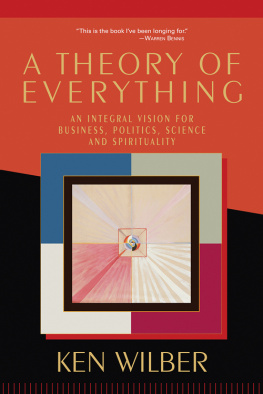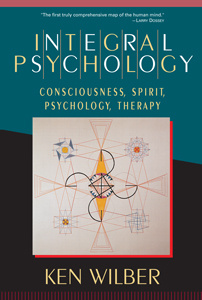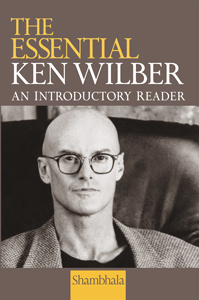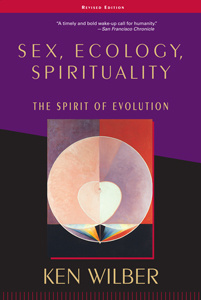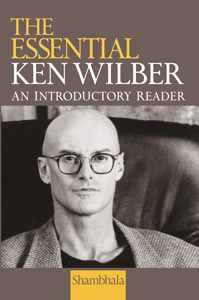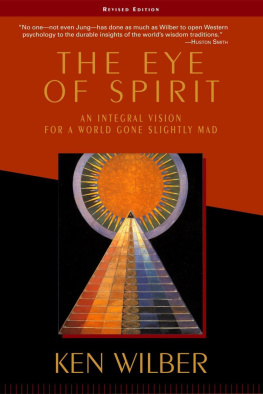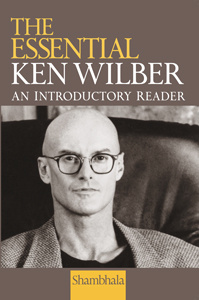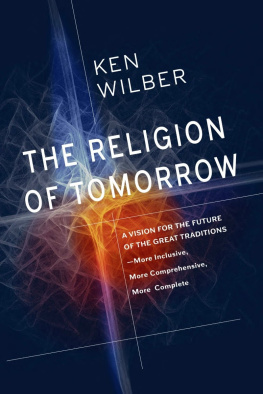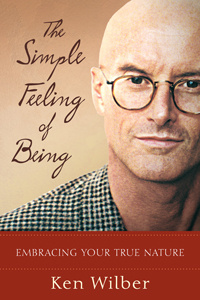
Wilbers integral vision offers readers the opportunity to make valuable connections among disparate disciplines andjust maybeto prepare themselves for a brave new world.
Publishers Weekly
A soaring tour de force and daring exposition by one of Americas most inventive thinkers. Don't quit the search for an integral culture until you have given it a whirland take this book with you as a sturdy guide.
Professor Harvey Cox, Harvard Divinity School
Ken Wilber is one of the most creative spiritual thinkers alive today, and A Theory of Everything is an accessible taste of his brilliance. Like a masterful conductor, he brings everyone in, finds room for science and spirit, and creates music for the soul.
Rabbi Michael Lerner, author of The Politics of Meaning
ABOUT THE BOOK
Here is a concise, comprehensive overview of Wilbers revolutionary thought and its application in todays world. In A Theory of Everything, Wilber uses clear, nontechnical language to present complex, cutting-edge theories that integrate the realms of body, mind, soul, and spirit. He then demonstrates how these theories and models can be applied to real-world problems in areas such as politics, medicine, business, education, and the environment. Wilber also discusses daily practices that readers take up in order to apply this integrative vision to their own everyday lives.
KEN WILBER is the author of over twenty books. He is the founder of Integral Institute, a think-tank for studying integral theory and practice, with outreach through local and online communities such as Integral Education Network, Integral Training, and Integral Spiritual Center.
Sign up to learn more about our books and receive special offers from Shambhala Publications.

Or visit us online to sign up at shambhala.com/eshambhala.
SHAMBHALA PUBLICATIONS, INC.
Horticultural Hall
300 Massachusetts Avenue
Boston, Massachusetts 02115
www.shambhala.com
2000 by Ken Wilber
All rights reserved. No part of this book may be reproduced in any form or by any means, electronic or mechanical, including photocopying, recording, or by any information storage and retrieval system, without permission in writing from the publisher.
The Library of Congress catalogs the hardcover edition of this book as follows:
Wilber, Ken.
A theory of everything: an integral vision for business, politics, science, and spirituality/Ken Wilber1st ed.
p. cm.
Includes index.
eISBN 978-0-8348-2304-4
ISBN 978-1-57062-724-8 (cloth)
ISBN 978-1-57062-855-9 (pbk.)
1. Life I. Title
BD431 .W5155 2000
191dc21
00-040024
A T THE DAWN OF THE MILLENNIUM, whats the hottest item on the intellectual front? An item that commands the interest of academia as well as intellectual fashion magazines such as Atlantic Monthly and the New Yorker? That captures public interest as well as professorial? That promises finally to reveal long-hidden secrets of the human condition? Whose terms those in the know can quickly name, if not explain, and thus beam with this searingly hot new idea?
Some would say evolutionary psychology, which is the application of evolutionary principles to the study of human behavior: you know, human males are sexually profligate and females are nest-builders because a million years of natural selection have made us so. Evolutionary psychology has indeed become a very hot item, largely because it has managed to displace three decades of postmodernism, which previously was the megahip item but is now met with a slow yawn and casual scorn: postmodernism is so yesterday (and isnt that ironic?). Postmodernism had built its huge band of followers largely on its capacity to deconstruct everybody elses ideas, leaving the wielder of this postmodernist demolition as the king or queen of the academic hill.
Evolutionary psychology managed to pull the rug out from under the rug-pullers, and it did so by showing that evolutionary principles give much more interesting and compelling explanations of human behavior than the standard postmodern claim that all behavior is culturally relative and socially constructed. Evolutionary psychology made it clear that there are indeed universals in the human condition, that evolution can be denied only by embracing incoherence, and that, most of all, postmodernism just wasnt any fun any more.
Evolutionary psychology is actually a branch of a radically new understanding of evolution itself. The previous neo-Darwinian synthesis saw evolution as the result of random genetic mutations, the more favorable of which (in terms of survival value) are carried forward by natural selection. This theory always left many people with a deeply uncomfortable feeling: how could all of the extraordinary vitality and diversity of life come from a universe that is supposed to be governed solely by the laws of physics, laws that bluntly assert that the universe is running down? The second law of thermodynamics tells us that in the real world, disorder always increases. Yet simple observation tells us that, in the real world, life creates order everywhere: the universe is winding up, not down.
The revolutionary new understanding found in chaos and complexity theories maintains that the physical universe actually has an inherent tendency to create order, just as when water chaotically washing down the drain in your bathroom sink suddenly organizes itself into a beautiful swirling whirlpool. Biological life itself is a series of swirling whirlpools, creating order out of chaos at every turn, and these new and more highly ordered structures are carried forward by various selection processes operating at all levels, from physical to cultural. In the human domain, this shows up in exactly the behavior studied by the new evolutionary psychologya very hot topic, understandably!
Still, as hot as evolutionary psychology is, its not the hottest. Starting seriously in the early 1980s and building to something of a crescendo in the late 1990s, the world of physics began to hum with rumors of a theory of everything: a model that would unite all the known laws of the universe into one all-embracing theory that would literally explain everything in existence. The very hand of God could be seen in its formulas, some whispered. The veil had been lifted from the face of the ultimate Mystery, others said. The final Answer was at hand, the hushed consensus hinted.
Known as string theory (or more accurately, M-theory), it promises to unite all of the known models of physicscovering electromagnetism, nuclear forces, and gravityinto one all-encompassing supermodel. The fundamental units of this supermodel are known as strings, or one-dimensional vibrating chords, and from the various types of notes that these fundamental strings play, one can derive every known particle and force in the cosmos.
M-theory (the M is said to stand for everything from Matrix to Membrane to Mystery to Mother, as in the Mother of All Theories) is indeed an exciting and promising model, and should it eventually prove soundit has yet to have any extensive physical corroborationit would indeed be one of the most profound scientific discoveries of all time. And that is why, for those in the know, string theory or M-theory is the hottest of the hot intellectual stories, an explosively revolutionary supermodel that pushes even evolutionary psychology into the mundane corner of the merely interesting.
Next page
